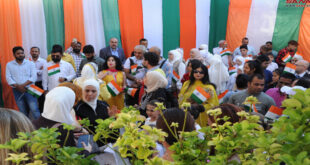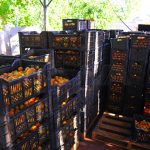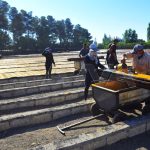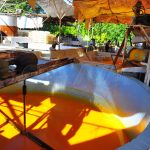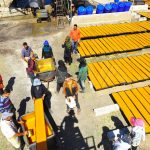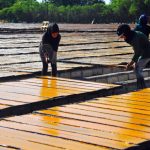Damascus, SANA – In the orchards of the Ghouta in Damascus Countryside begins the journey of making Qamar al-Din, a beverage dried rolls of apricot.
Mohammad Bashar Jawish, owner of a facility for making Qamar al-Din, walked SANA’s reporter through the process of making Qamar al-Din, which begins by selecting the best freshly-picked apricots, which is a crucial step because the apricot harvest season is limited to around 45 days.
After the apricots are delivered, they are sorted and washed using machines and then placed in a chrome pressing machine that first deseeds the apricots then filters fibers and skin.
Afterwards, the juice is mixed in a vat with glucose until soft and homogenous, then the mix goes through mechanical sieves and is melted in a burner.
The melted material is then poured on flat surfaces and are sun-dried for five days, after which they are wrapped in plastic and stored in warehouses to cool down for a few days, after which the material is cut and rubbed with olive oil before being packaged.
Jawish noted that the seeds that are removed during the manufacturing of Qamar al-Din are dried then pulverized to separate the kernel from the hard shell, and the kernels are exported as they are used to make various products.
He went on to note that Qamar al-Din is rich in potassium and vitamin A, and demand for it soars during the month of Ramadan, as the drink made by mixing pieces of Qamar al-Din with water helps digestion.
Jawish said that although some Syrians produced Qamar al-Din abroad, their products couldn’t compete with the locally-made original, and this is due to the fact that the best type of apricot for making Qamr al-Din grows only in Ghouta.
He noted that the process of making Qamar al-Din has evolved through time, as it originally employed simple manual tools and equipment, but back then the overall production during a season wouldn’t exceed 100 tons, while now there are several facilities that make tens of tons.
Hazem Sabbagh
 Syrian Arab News Agency S A N A
Syrian Arab News Agency S A N A


